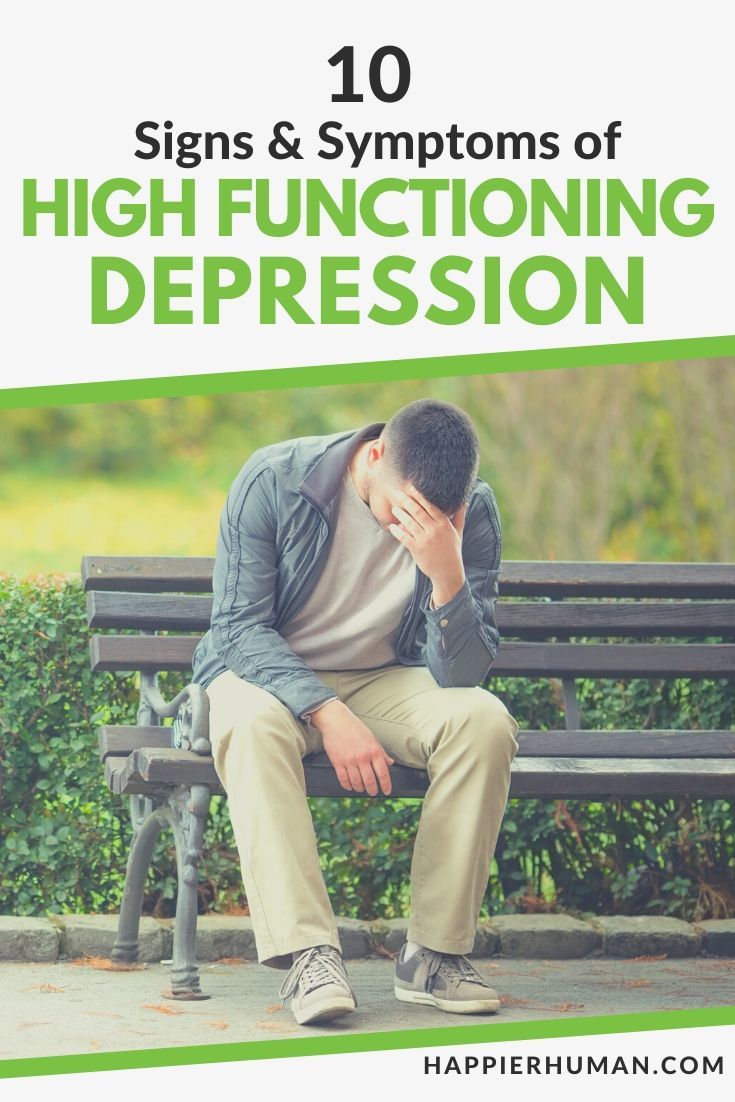Often referred to as the leading cause of disability, depression has been on the rise in recent decades.
Nobody knows exactly why…
Some speculate it’s the result of rapid population growth. In other words, the more people you have in a community, the higher the number of individuals with depression.
Others believe that abrupt (economic and social) changes coupled with the constant pressure to adapt, can take a toll on your mental health and wellbeing.
But what everyone can agree on is that many who are dealing with this condition today suffer in silence. It’s a new form of depression called ‘high functioning depression.’
So, how can you identify this silent mood disorder that chips away at your happiness and wellbeing?
Is High Functioning Depression a Real Thing?
One of the reasons why you don’t hear that much about high functioning depression is that it often goes undiagnosed.
Many who suffer from this condition ask for help when they’re already dealing with severe symptoms.
To be honest, most of the clients whom I’m treating for depression arrive in therapy for completely different reasons. More specifically, they are high achievers who often think they’ve worked themselves too hard and are on the brink of burnout.
But whenever I take a closer look at their day-to-day life, I understand why high functioning depression is so easy to miss.
Put yourself in my shoes and imagine you’re talking to someone who works nine hours a day, goes to the gym, has a relationship, invests in hobbies, and hangs out with his/her friends during weekends.
Based on a first impression, would you believe that person is dealing with depression?
Of course not!
You would most likely think he or she has everything under control.
Fortunately, my training as a psychologist allows me to peek behind the curtains. What I often discover are profound feelings of loneliness, exhaustion, and denial.
But it’s difficult to see (and accept) your emotional pain, when you cover it with long hours at the office, online shopping, social media, and other 21st century distractions.
In fact, it is because they’re able to go about daily tasks that people with high functioning depression believe they should just push through their unpleasant emotions.
Long story short, high functioning depression proves that emotional pain can sometimes hide behind success and happiness.
10 High Functioning Depression Signs to Look Out For
1. You Bury Yourself in Work
For people who are dealing with high functioning depression, the office becomes a refuge from negative thoughts and unpleasant emotions.
It’s easy to ignore the mess in your personal life when you overwhelm yourself with business meetings and work-related tasks.
In time, this unhealthy coping strategy can lead to chronic stress and burnout.
Think about how much time you’ve spent at the office over the last few weeks. Did you do it because you had a lot on your plate or are you running from something?
2. You Are Overly Critical Towards Yourself and Others
Another sign to look out for is criticism. In other words, you tend to be harsh and critical with yourself, others, and the world in general.
It’s like nothing and no one is good enough for you. Your boss is too strict, your colleagues are against you, your friends are too demanding, and the world seems unfair.

But you don’t notice the critical voice because you’re too busy distracting yourself from all those painful emotions you don’t want to confront.
If you stop for a moment to look inward, you might realize that your critical attitude stems from lack of self-confidence and negative thinking.
3. You Aim for Unrealistic Standards
Overcompensation is another unhealthy coping strategy that people with high functioning depression often resort to. This usually comes in the form of ridiculously high and unrealistic standards.
In other words, you set the bar high to prove yourself (and others) that you’re ok or that you’re strong enough to overcome depression on your own.
But the higher the standards, the smaller the chances of achieving them. Basically, you’re setting yourself up for failure without even realizing.
This will, in turn, reinforce dysfunctional beliefs such as “I’m not good enough” or “I’m a failure.”
4. Or, You ‘Power Down’
On the opposite spectrum of unhealthy coping strategies for depression is idleness. Although it’s not characteristic for people who are dealing with high functioning depression, I’ve decided to add it to the list simply because it’s a common sign.
Depression kills your motivation and puts you in a state of idleness where you daydream for hours on end.
But before you label them as ‘lazy’, put yourself in their shoes for a moment.
How do you expect to be productive and have an active lifestyle when you barely have the energy to get out of bed in the morning?
How do you expect to set and pursue goals when your mind keeps telling you that everything is pointless, and you’re doomed to fail no matter what?
5. You’re Cranky and Moody
We know that depression is often associated with idleness and passivity. It’s like nothing and no one can trigger an emotional response from you. Life seems plain, boring, and uneventful.
But you might be surprised to hear that high functioning depression can do the exact opposite.
In other words, if you’re dealing with this condition, you might notice that you’re cranky all the time. You get irritated at the slightest discomfort and even respond with angry outbursts to minor events such as your partner making a ‘bad’ joke.
6. You Feel Tired (Even After a Good Night’s Sleep)
One symptom that all forms of depression have in common is exhaustion.
When you insist on going about your life like everything’s ok – but emotionally speaking you’re running low on resources – you will begin to experience frequent episodes of exhaustion.
Even though you want to push on, it’s like every cell in your body screams “I can’t do it!”
No matter how much you sleep and how healthy you eat, you still get tired more easily than you used to.
That’s because the problem isn’t your lifestyle, but the emotional turmoil that’s draining your energy.
But if you're curious to find out if there are other reasons for your tiredness, take a few minutes to watch the video below:
7. You Can’t Put Your Mind on Pause
To avoid confronting the real problem, people with high functioning depression keep themselves as busy as possible.
You run from one meeting to another, eat on the go, and continue to work even when you get home. You would do anything to avoid those moments when you can hear yourself thinking.
The reason why you don’t want to stop is that you’re afraid of the ‘dark’ and unpleasant thoughts that might occur when you take some time off.
You’re afraid that if you put the spotlight on yourself, the things you might discover will only make you feel disappointed and discouraged.
8. You Feel Like Something Bad Is About to Happen
Depression is often accompanied by anxiety.
In fact, the boundary between depression and anxiety is often blurry.
When you’re feeling hopeless and lost, the future begins to look foggy and unstable. Depression makes you lose control over who you wish to become and replaces your optimism with a grim perspective on life.
You feel as if things could turn from bad to worse in no time and you’re afraid you won’t be able to handle it. And that’s because you’re too exhausted from the emotional struggle that you put up with every day.
9. You Make Mountains Out of Molehills
As I said earlier, when you’re dealing with high functioning depression, you tend to have an extremely low tolerance to frustration and discomfort.
Events that would not have affected you before – like a flat tire – now seem like the end of the world.
You make mountains out of molehills by exaggerating the impact of seemingly ‘benign’ situations.

In a way, this attitude is perfectly understandable, given that you’re already on the verge of total collapse, so all it takes is one minor incident to feel like your life is broken beyond repair.
10. You Doubt Your Decisions
Depression, be it high functioning or any other form, affects your ability to make decisions.
You lose confidence in your skills and doubt every decision you make, even those that have no significant impact.
It seems doubt and depression make a ‘perfect’ match; a vicious circle where depression makes you doubt who you are which in turn, deepens your sense of worthlessness.
Resources and Tips to Help with Depression
Now that you’re familiar with the main signs & symptoms of high functioning depression, allow me to share a few resources and tips.
Getting a handle on depression is no easy task so it’s crucial to take advantage of all the resources and support that you can get.
Take a 3-Minute Depression Test
Since depression is one of the most common mood disorders, there are numerous tests and screening tools that can help you get a better sense of what you’re dealing with.
Aside from the tools that only licensed professionals can use, you will also find online tests for depression.
But not everything you find online is valid or accurate.
To save you the effort of verifying the credibility of online resources, I found two depression tests that I believe are worth taking into consideration.
The first one is a 10-item test provided by Psycom. I also encourage you to go through their materials on depression, mental health, and wellbeing.
Another useful resource for people who might be dealing with depression is Psych Central. Aside from in-depth educational guides on mental health issues, they also have 18-item depression quiz.
It takes about five minutes to figure out if you’re dealing with a form of depression.
Educate Yourself
Taking an online depression test is the easy part. What comes next will require more action and effort.
I’m talking about educating yourself on what it means to deal with a mental health condition like depression.
Since information is only a click away, the online environment can be a goldmine for anyone who wants to understand how depression works. There are literally thousands of articles, blogs, guides, and videos on anything and everything related to mental health.
But just as not all online tests are valid, not all sources of information are trustworthy.

Which is why I’ve taken the liberty of recommending a few websites that provide quality, science-backed content on depression.
For instance, you can start with this brief guide from Psychiatry.org that covers all the basics you need to know about depression..
As for books, the ones that I usually recommend to my clients are:
We’re living in an age where psychoeducation is more available than ever so why not take advantage of this to improve the quality of our lives.
Consult a Professional
The one thing I say to anyone who thinks they might be dealing with depression is “Go see a professional.”
While online resources might prove useful, they can’t replace the training and experience of a licensed mental health worker.
For those who are dealing with high functioning depression, it’s usually friends and family who encourage them to see a psychologist or psychiatrist.
Unfortunately, help often comes when the person has already reached a critical point. That’s because people with high functioning depression suffer in silence and avoid letting others see them as vulnerable and in need of emotional support.
In fact, consulting a professional is the first and often the hardest step towards a healthier and happier life.
The treatment is similar to that of any other form of depression, consisting of psychotherapy, medication, or a mix of both. But unlike in the case of other forms of depression, progress may be slower given that high functioning depression is ‘subtle’ and doesn’t alter your overall mood that much.
If you wish to overcome depression and regain your happiness and wellbeing, your best chance is with the help of a licensed professional.
If you need immediate professional help, please take the steps to get it.
If you feel suicidal, please immediately call the National Suicide Prevention Hotline at
1-800-273-8255
Other phone numbers to get help with your loneliness and depression immediately include:
- Samaritans 24-hour Crisis Hotline (open 24/7): 212-673-3000
- United Way Helpline (which can help you find a therapist, health care, or basic necessities): 800-233-4357
Websites to find help with loneliness and depression:
- National Alliance on Mental Illness 1-800-950-NAMI (1-800-950-6264)
- Anxiety and Depression Association of America1-240-485-1001
- American Psychological Association 1-800-374-2721
- Depression and Bipolar Support Alliance1-800-826-3632
- National Institute of Mental Health
Talk to Your Friends and Relatives About Depression
When it comes to mood disorders, social support is a key aspect of recovery.
In fact, a Harvard study that has been carried out for nearly 80 years (and still counting!) has revealed that the quality of our lives depends on the quality of our relationships.
Your friends, relatives, colleagues, or coworkers can be a valuable source of emotional support.
But the only way for them to lend an empathetic era or shoulder to cry on is if you find the courage to ‘open up’ about your struggle with depression.
To be perfectly honest, no everyone will understand what you’re going through. In fact, you might even receive criticism and unsolicited advice.
However, some will resonate with your pain, understand your needs, and offer the kind of support that allows you to overcome depression at your own pace.
It’s about accepting your vulnerabilities and sharing the burden with another human being.
You don’t have to face this alone. Talk to your friends and relatives about depression.
Join a Support Group
For people struggling with depression, the Internet isn’t just a valuable source of information about mental health.
It can also provide safe spaces where people share their stories, ask for advice, and provide encouragement to others who are dealing with the same emotional problems.
Online support groups can be a valuable resource for those who are dealing with depression but might not have close friends and relatives who can help them.
If you feel like you need face-to-face interactions, the Anxiety and Depression Association of America has put together a list of support groups from all cross the country.
You can gain tons of encouragement and motivation by spending time and talking with people who share the same emotional problems.
Final Thoughts on High Functioning Depression
In broad lines, depression is the result of dissatisfaction, lack of emotional resilience, and multiple unresolved emotional problems.
When it comes to high functioning depression, the symptoms are not fundamentally different from other forms of depression, but they do tend to be more subtle.
On top of that, people with functional depression often deny the severity of their condition and insist on going about their day-to-day life.
Without the intervention of friends, relatives, or coworkers who can see the problem from the outside, only a few of them realize that something’s wrong.
This is the reason why I believe it’s crucial to know the signs & symptoms of high functioning depression so that you can avoid an emotional catastrophe.
Take a good look at yourself, accept your vulnerabilities, be open about your struggles (with people who are willing to listen empathically), and don’t be afraid to ask for help.
Happiness and health depend greatly on our ability to adjust and use the resources (emotional and material) we have at hand to improve the quality of our lives.
And if you're looking fore more resources, read these blog posts:
- Can Depression Make You Physically Sick? Our Answer…
- Am I Depressed or Lazy? 10 Ways to Find Out
- How to Deal with Loneliness: A 10-Step Process

Alexander Draghici is a licensed Clinical Psychologist, CBT practitioner, and content writer for various mental health websites. His work focuses mainly on strategies designed to help people manage and prevent two of the most common emotional problems – anxiety and depression.


